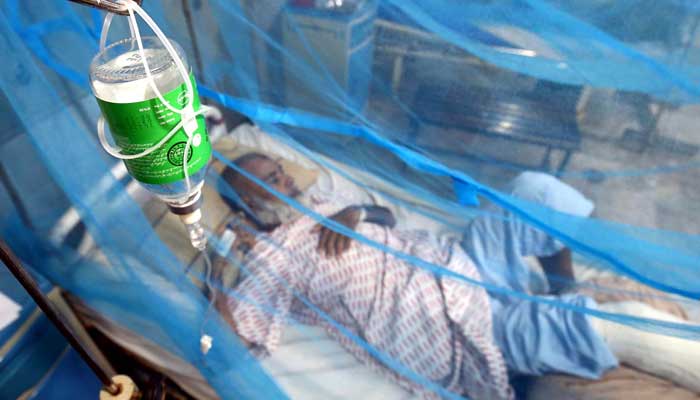Pakistan requests $281m grant to fight AIDS, TB, Malaria
NHS, R&C ministry says it requested funding agency to provide funds to govts and NGOs
March 23, 2023

- $181m are allocated for TB control, and $65m for HIV AIDS.
- $34 million dispensed to control malaria.
- 27,000 new HIV infections projected in 2022.
ISLAMABAD: For the first time in Pakistan's history, the federal health authorities have successfully submitted three funding proposals to get the Global Fund to Fight AIDS, Tuberculosis and Malaria (GFATM) grant in the first window, calling for the provision of funds to both government institutions as well as non-governmental organisations, officials said on Wednesday.
The international financing and partnership organisation has allocated over $281 million from 2023-2025 to fight AIDS, tuberculosis (TB) and malaria to build a resilient and sustainable health system in Pakistan, health officials said adding that the grant will be utilised from January 1, 2024 to Dec 31, 2026.
Even the World Health Organisation (WHO) representative to Pakistan Dr Palitha Mahipala congratulated the Common Management Unit (CMU) for HIV, TB and Malaria for submitting the funding requests to the Global Fund on time, hoping that the grant would help the country in preventing and managing both infectious and vector-borne diseases.
“For the first in history, all proposals have been submitted by the Pakistani health authorities on time to get GFATM grant. I’m sure a huge chunk of money, more than $280 million, will be coming to Pakistan, which will strengthen the health system to respond to these three diseases,” Dr Palitha Mahipala said on the eve of World TB Day 2023.
Officials in the National Health Services, Regulations and Coordination (NHS, R&C) ministry told The News that this submission was the result of several weeks of hard work, support from UN partners, consultations with national and international health experts as well as Community-Based Organizations (CBOs), adding that despite the additional safeguard policy, they had requested the funding agency to provide funds to both the government and the NGOs.
“In our funding proposals, we have submitted that both the government and NGOs should be made the principal recipients of the global fund grant as without funds, federal and provincial programmes cannot take measures to manage and prevent these diseases,” an official of the NHS, R&C said.
According to the allocation letter for the $281 GFATM funds, around $181 million are allocated for TB control, $65 million for HIV prevention, as well as treatment and $34 million for malaria control. In the previous grant cycle, the principal recipients for tuberculosis and malaria were national TB and national malaria control programmes respectively, said the official, adding that the principal recipient for HIV was the United Nations Development Programme (UNDP) and a private organisation Nai Zindagi Trust.
The Global Fund’s grant for HIV response is provided to five sub-recipients, including the National AIDS Control Programme (NACP) and provincial AIDS control programmes of Punjab, Sindh, Khyber Pakhtunkhwa and Balochistan, said the official. He added that the CMU, under the leadership of NHSR&C was, negotiating with the Global Fund to make CMU the principal recipient.
Experts are of the view that despite spending millions of dollars, new HIV infections increased by 84% from 2010 to 2022. Around 25,000 new HIV infections were reported in 2021, whereas 27,000 are projected in 2022. Pakistan is one of the few countries in the Asia Pacific Region, where new HIV infections are prevalent.
The Joint United Nations Programme on HIV/AIDS (UNAIDS) termed the country’s HIV situation a major cause of concern, as per a research journal report. According to national data, over 10,000 people were diagnosed with HIV from January to December 15, 2022, including 496 from the Islamabad Capital Territory.
WHO experts believe that new HIV infections were increasing in all four provinces of Pakistan but in Punjab and Sindh they were increasing manifold. Out of 210,000 HIV cases in Pakistan, 50% and 43% of patients are from Punjab and Sindh, respectively. The epidemic remains largely concentrated in key populations, they added.
Similarly, TB and malaria cases are also on the rise in Pakistan. According to WHO officials in Islamabad, Pakistan currently ranks fifth in terms of the highest TB cases, while malaria cases have doubled in 2022 as against the last year. The country reported five million malaria cases this year. They called for complete overhauling and revamping of the HIV, TB and malaria control programmes to prevent new cases.









